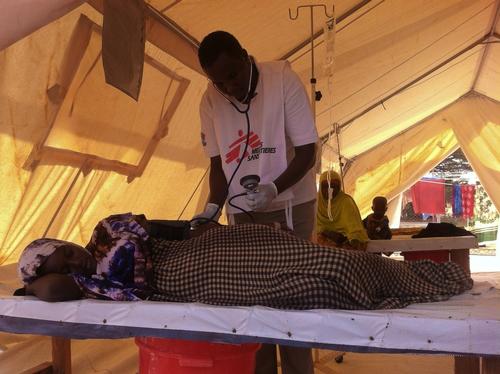A cholera epidemic that has been spreading in Kenya for over a year has now hit the Dadaab Refugee Camp complex, on the border with Somalia. So far around 541 people have reportedly been affected, the majority of whom are living in Dagahaley Camp.
MSF has expanded its regular hospital activities in Dagahaley and has constructed a cholera treatment centre to deal with the influx of patients. With the rainy season making already poor living conditions even worse, MSF is concerned that the epidemic could spread further.
The cholera epidemic has affected 16 counties in Kenya since December 2014. It was officially declared in Dadaab on 23 November 2015.
Funding cuts causing decline in services for refugees
“The fact that this outbreak has occurred further highlights the dire hygiene and living conditions in the camp and a lack of proper long-term investment in sanitation services”, says Charles Gaudry, Head of Mission for MSF in Kenya.
“Refugees, who are entirely dependent on aid, are now paying the price for services that have not been properly maintained over the last few years due to funding cuts from donors. There are insufficient latrines for the population size, and they have not received soap for the last two months. In addition to the ongoing cholera outbreak, the number of patients in the hospital has also doubled over the last week - children are the most affected, including many who have malnutrition.”
MSF responds to cholera
Seven people in Dadaab have died since the cholera outbreak began. In the last three weeks, MSF has admitted 307 patients to its treatment centre. Approximately 30 per cent of the patients who have been admitted so far are children under 12.
MSF teams are also working throughout the camp to provide health education sessions on cholera and good hygiene practices. Additionally, teams are visiting the homes of patients admitted to its treatment centre and spraying the houses with chlorine solution in order to prevent further spread of the disease.
“The rains are exacerbating an already precarious hygiene situation”, continues Gaudry. “After each heavy rain, we see an increase of patients in our treatment centre. While immediate measures are now being put in place to address the cholera outbreak, it is crucial also that proper investment is made on a longer term basis to improve living conditions for refugees and prevent future epidemics.”
Once people are infected through contaminated water or food, cholera spreads quickly. This spread is accelerated by poor hygiene practices and inadequate sanitation. The disease can only be halted by improving hygiene conditions.
Cholera can be treated simply and successfully by immediately replacing the fluids and salts lost through vomiting and diarrhoea. Cholera patients are always treated with oral rehydration solutions and antibiotics. Severe cases will require fluid replacement via an intravenous drip.
Since the cholera outbreak began in Kenya, MSF has been working in collaboration with the Ministry of Health in 17 counties supporting patient care and epidemic control measures.
More than 8,360 patients have been treated in Ministry of Health facilities with the support of MSF.
In Dadaab, MSF is currently the only provider of medical care in Dagahaley Camp, where it runs a 100-bed hospital and two health posts, managed and run by its Kenyan staff. The hospital provides inpatient and outpatient services, including surgery, maternity care, HIV and TB treatment, and an inpatient feeding centre for malnourished children.
In 2014, MSF provided 180,000 outpatient consultations, admitted 12,000 people as inpatients, provided 12,000 antenatal consultations, and delivered 3,240 babies. MSF has been working in Dadaab for 20 years.



